7 Crystal Clear Signs of Retaliation at Work
If an employer feels they’re getting the short end of the stick, then they may look to get even with the employee. This is where retaliation comes into play.

The U.S. Equal Employment Opportunity Commission (EEOC) reports that in 2020 about 60 percent of all discrimination complaints realted to retaliation.
Bullying and unfair treatment isn’t just happening in academic settings, but in the workplace too.
Luckily, this is exactly why the EEOC exists. To enforce laws that protect employees from harassment and abuse in a work environment.
Workplace harassment becomes illegal when the behavior becomes a condition of employment. Also, when the harassment is severe enough that any reasonable person can recognize the abuse or mistreatment.
Forms of workplace discrimination include targeting someone’s…
- Race
- Skin color
- Religious affiliations and beliefs
- Sex status
- Sexual orientation
- Gender identity
- Pregnancy status
- Place of national origin
- Age (beginning at the age of 40)
- Disability status
- Genetic information
- Family medical history
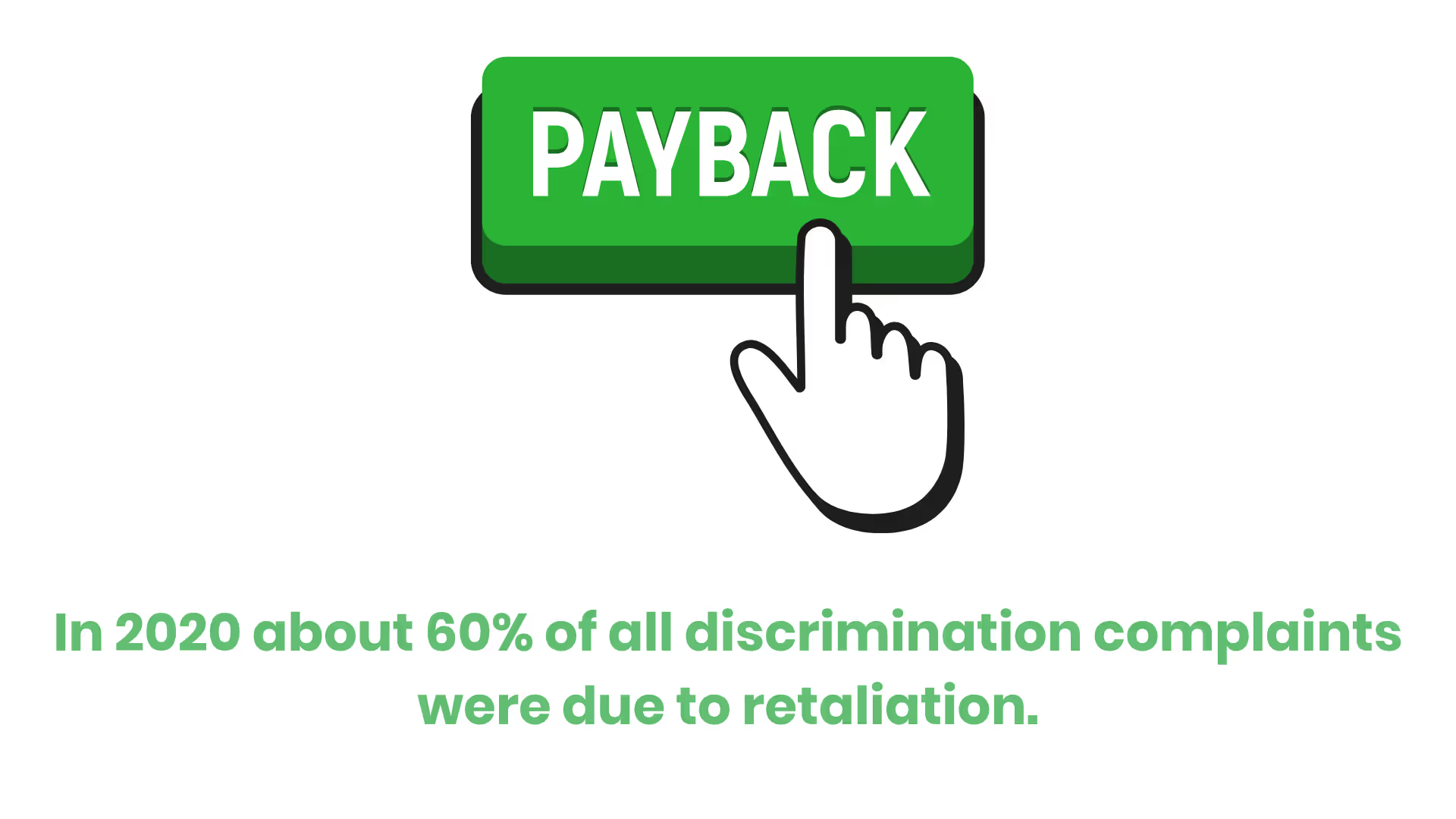
It’s best to file a complaint with your supervisor or human resources department when dealing with harassment or discrimination at the workplace.
However, sometimes management brushes off the situation or even becomes upset towards the victim for complaining. If an employer feels they’re getting the short end of the stick, then they may look to get even with the employee. This is where retaliation comes into play.
What is Workplace Retaliation?
Retaliation, according to the EEOC, includes punishing employees for asserting their rights to be free from employment discrimination including harassment.
Retaliation also applies to those not directly affected, but report harassment they’ve seen. Both of these groups who make reports are what society calls “whistleblowers”.
Believe it or not, the term whistleblower dates back to the 19th century. During that time, the connotation behind the word was mostly negative and essentially meant a “snitch”.
It wasn’t until recently that the definition has taken on a new role. The meaning of the term today refers to someone who reports illegal or unethical behavior at their workplace.
Examples of Retaliation that Occurs When an Employer Acts
Unfortunately, many employers don’t welcome whistleblowers and often meet them with backlash.
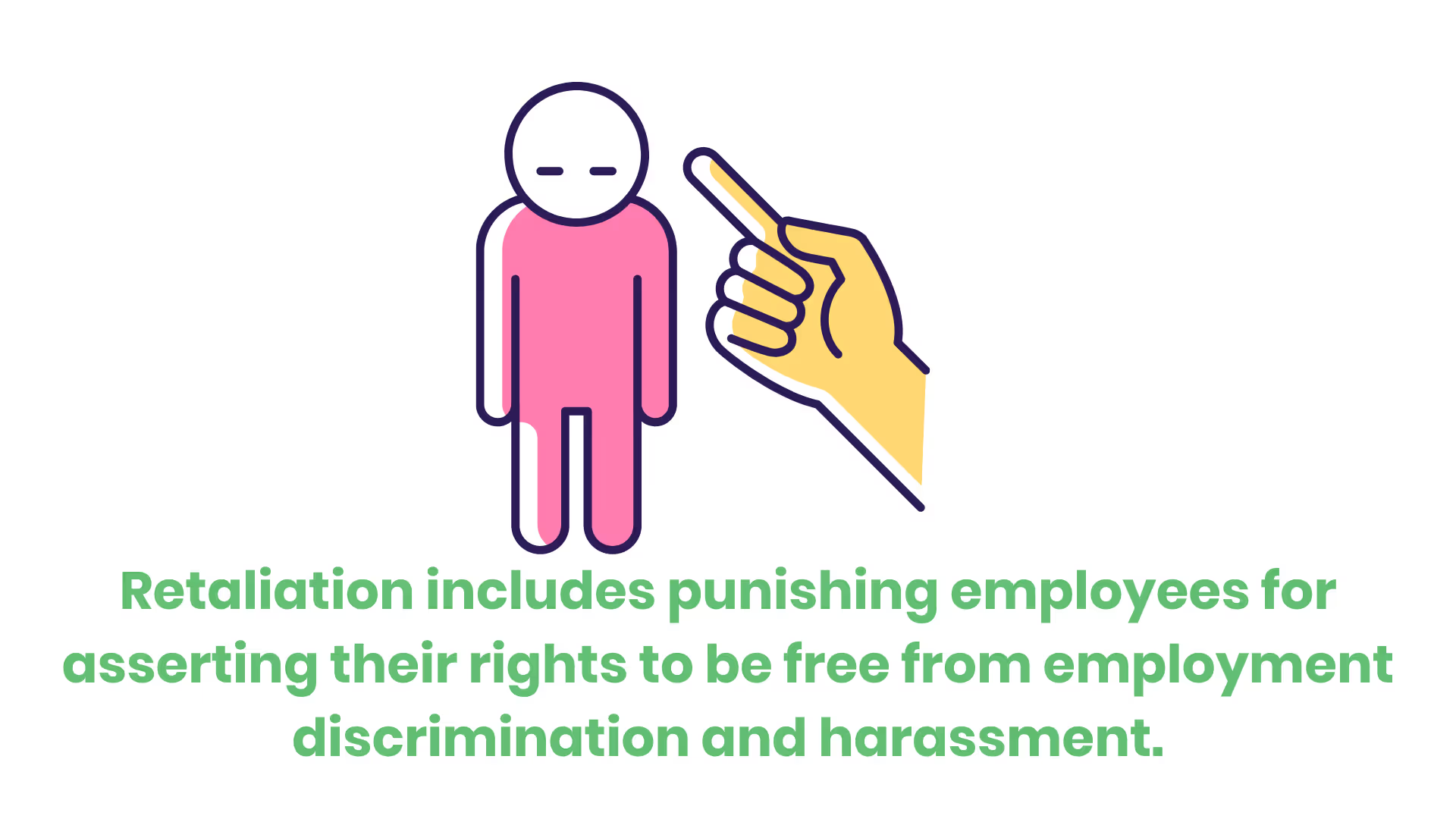
But, any activity that dissuades an employee from reporting a possible violation can be a form of retaliation.
Common activities that may incite retaliation include the following…
- Filing or being a witness in an EEO charge, complaint, investigation, or lawsuit.
- Communicating with a supervisor or manager about employment discrimination, including harassment.
- Answering questions during an employer investigation of alleged harassment.
- Refusing to follow orders that would result in discrimination.
- Resisting sexual advances, or intervening to protect others.
- Requesting accommodation of a disability or for religious practice.
- Asking managers or co-workers about salary information to uncover potentially discriminatory wages.
- Requesting or taking a leave of absence under the Family and Medical Leave Act (FMLA).
If you face consequences following one or more of these actions, you may have grounds for a legal retaliation claim.
What Are the Signs of Workplace Retaliation?
There are different ways an employer may show retaliation against an employee. Depending on the situation and the harasser, severity may vary.
A few examples of retaliation in the workplace include…
- Give a performance evaluation that’s lower than it should be; passed over for a promotion/raise.
- Transfer the employee to a less desirable position/shift.
- Cut an employee’s hours or pay.
- engage in verbal or physical abuse;
- Increase scrutiny.
- Termination/suspension.
Protection against retaliation applies to all employees, employment agencies, or labor organizations covered by the EEO laws. This includes applicants, current employees, and former employees. Let's take a closer look at what these kinds of retaliation entail.
Understanding Retaliatory Actions by Employers
Workplace retaliation occurs in all kinds of different forms. Retaliation can also be more difficult to spot than one might think. Companies may disguise their discriminatory workplace culture at first glance, however knowing what to look for can help you stay ahead of the curve. Simply understanding that retaliation and discrimination often overlap is important to know.
An employer punishes employees as a form of retaliation in different ways. Here are some of the more common retaliation tactics that still can be subtle and difficult to identify.
Sign 1: Passed Over for a Promotion/Raise
Imagine you’re up for a promotion. You’ve spoken to your boss about next steps, the entire company knows you’re sure to get it, and you’ve already told your family and friends. Yes, you’re that sure.
But, there was an issue where you took notice that a new employee was subject to harassment by someone in management and you made sure to report it.
Well, management didn’t appreciate it and to teach you a lesson, you didn’t get the promotion.
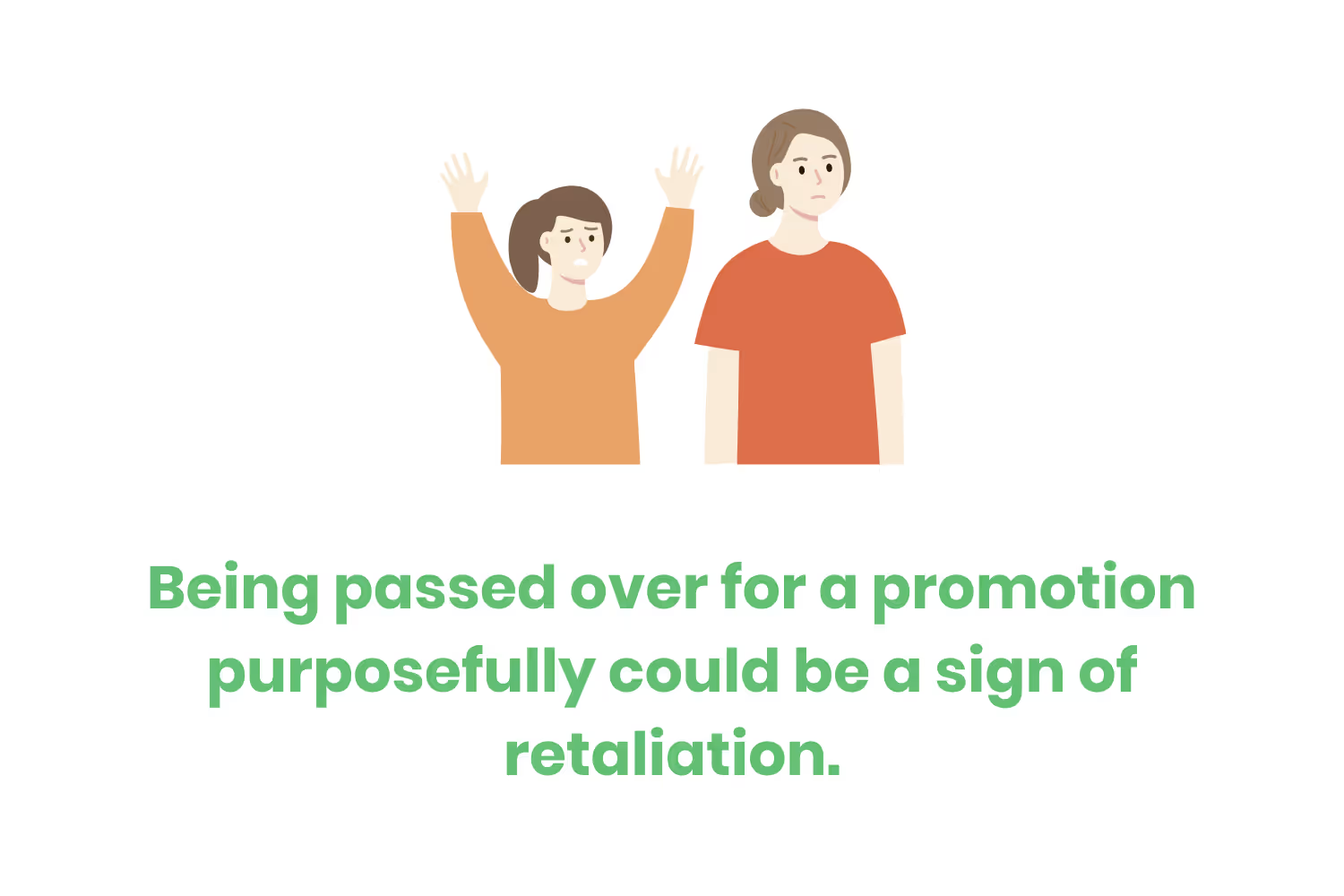
This is a perfect example of workplace retaliation.
Employers may think they’re beating the system because they aren’t outwardly firing someone. By not giving them a raise or a promotion, they can still create an unfair work environment for the employee and give them punishment.
This is actually retaliation and is just as illegal as firing someone for exercising their rights in the workplace.
Sign 2: Denied Advancement Opportunities
If you’re flatout denied advancement where you work, that’s a major sign of retaliation. It’s the exact opposite of what the EEOC stands for…unequal opportunity.
If you ask 10 people whether or not they want to advance at their job or in their career, I guarantee that at least 9 of them will say that they want to. That’s not a proven statistic, it doesn’t have to be. The fact of that matter is that people want to succeed at their job. But just in case you’re a statistics person, let’s break down this notion a little further.
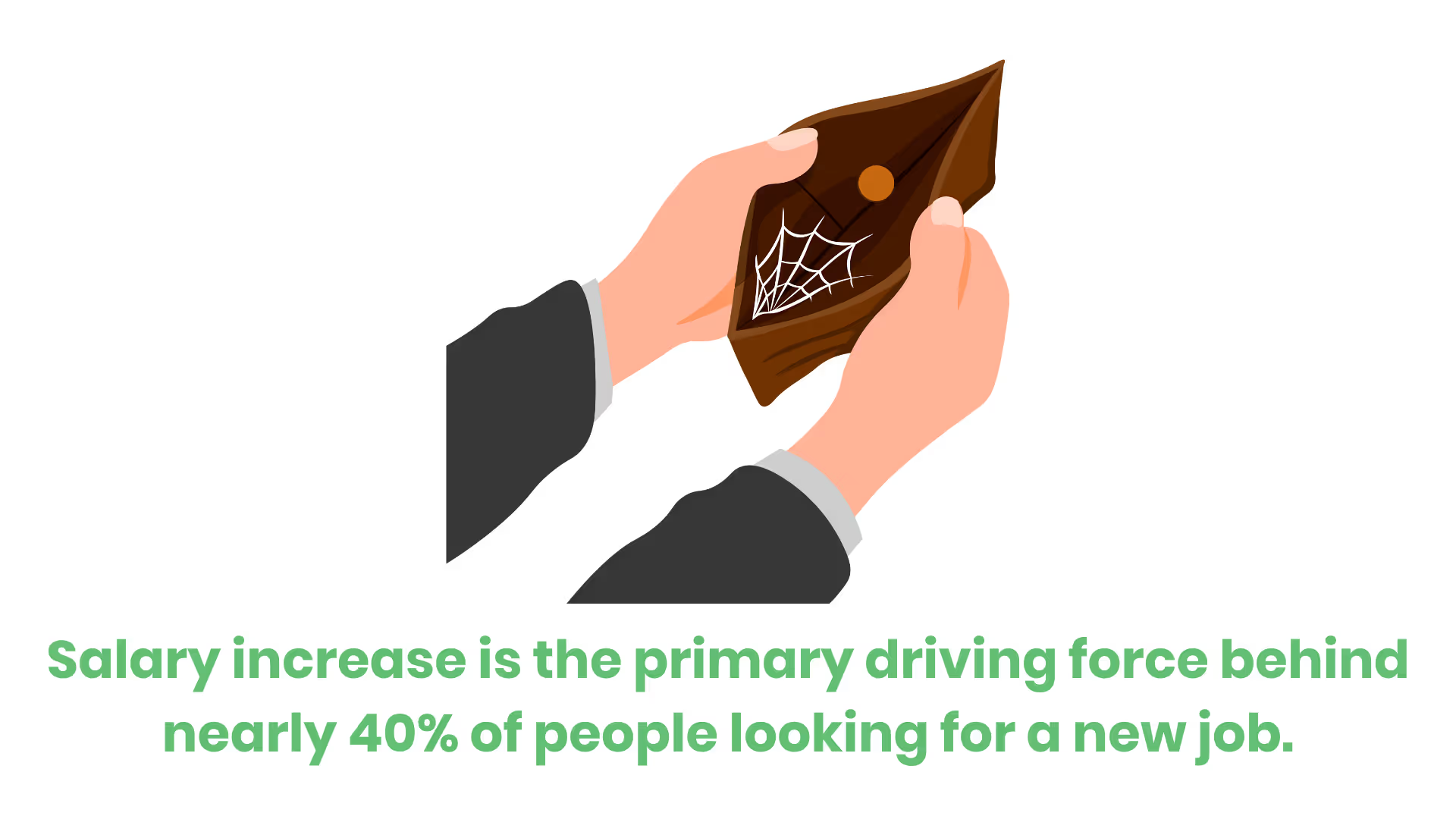
A recent survey determined that a salary increase is the primary driving force behind nearly 40% of people looking for a new job.
What does advancement opportunities usually lead to in the workplace? It SHOULD lead to an increase in salary. If you receive more responsibilities and work without an increase, it’s another sign of retaliation (more on that later).
Unfortunately, this type of retaliation might be one of the hardest to prove as an employee. Especially if your boss has been unfairly distorting your performance reviews.
Sign 3: Termination/Suspension/Reassignment
It’s illegal to ask someone to relinquish their current responsibilities for something less.
Or even worse, to terminate or suspend an employee. While retaliatory termination is widely understood by most employers/employees to be illegal, demoting or assigning someone a less than ideal job duty can be more subtle.
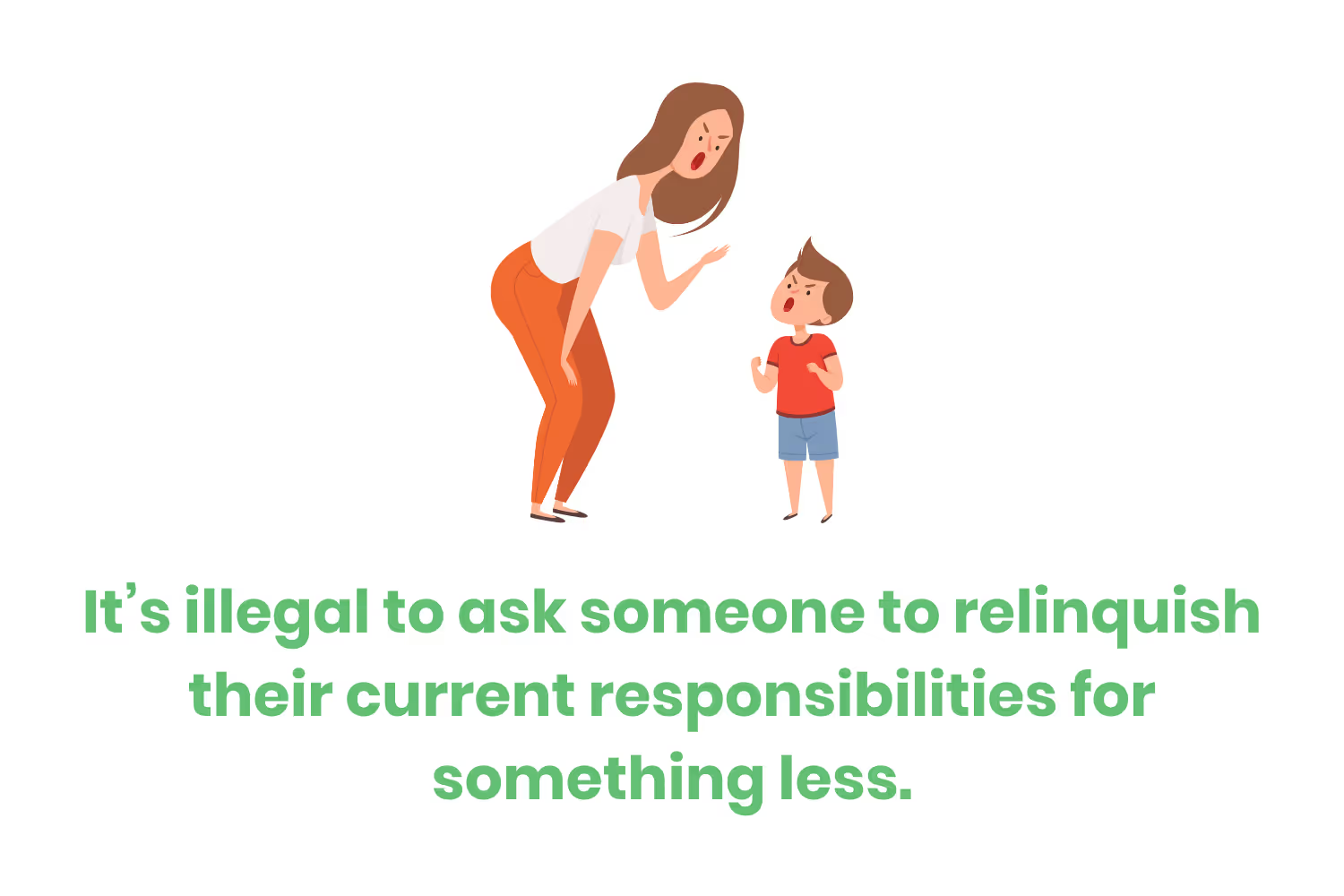
Whether the reassignment is temporary or permanent, giving someone less than ideal work tasks or conditions after they have made a complaint is a form of retaliation.
Many employers hope that by doing this they can get an employee to leave or quit on their own.
Sign 4: Cut Pay/Hours
Docking someone’s pay or the amount of hours they usually work is another common form of retaliation.
What could be the harm in changing the schedule of someone who hasn’t been showing up to work as often as they should, right? I mean, you want someone that is actually going to show up.
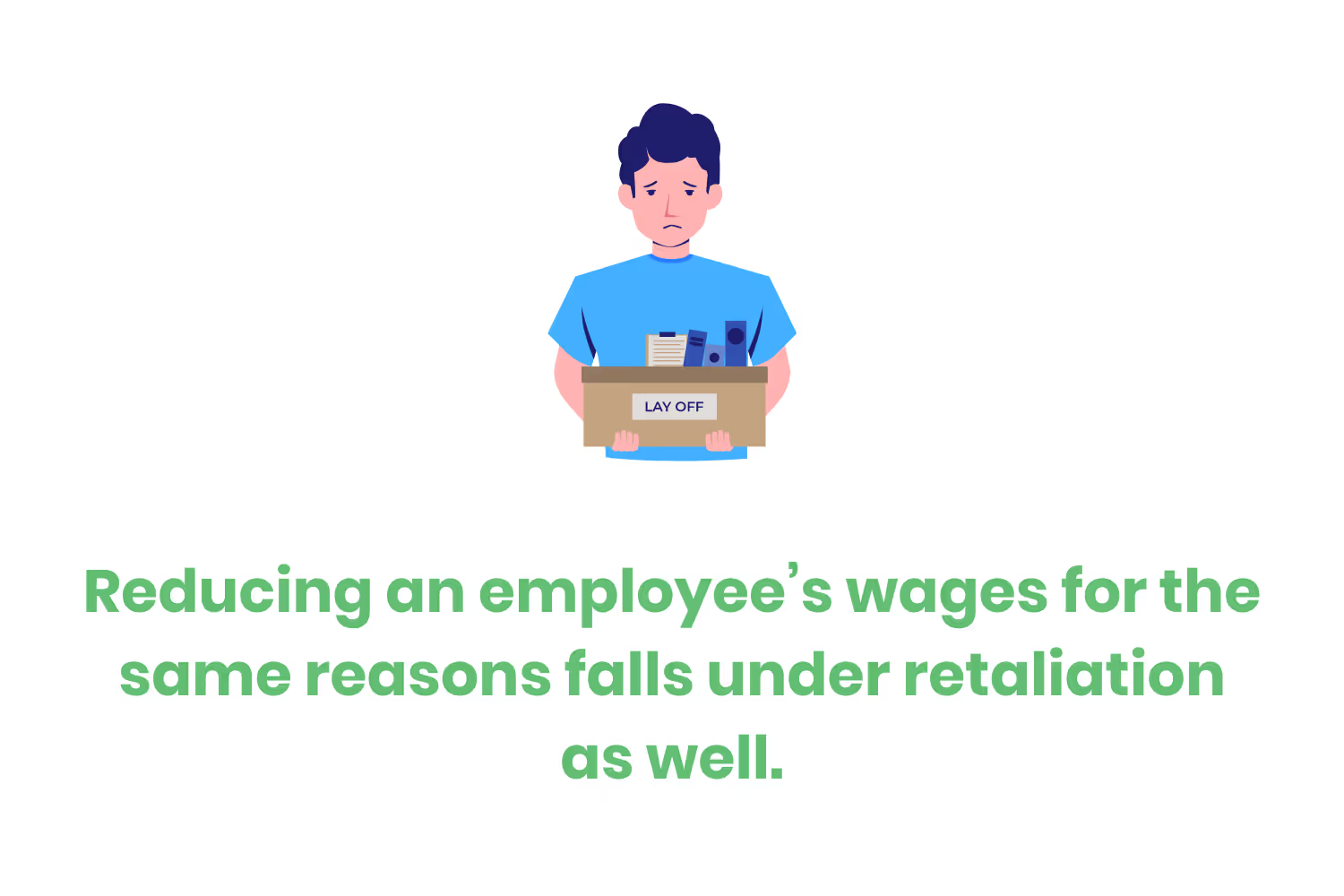
Believe it or not, this can leave a company wide open for a retaliation case.
For example, if someone is experiencing known medical issues that takes them out of work for an amount of time and an employer decides to cut their hours, this is illegal. The employee who lost hours due to their upset employer at their sudden change of availability has a potential retaliation case.
The same goes with the amount of pay. Reducing an employee’s wages for the same reasons falls under retaliation as well.
Sign 5: You're Always Asked To Do More
Another clear sign of retaliation at work is that you’re always asked to do more.
If you’re the owner or manager of an organization and you just read that last sentence, you might be a little shocked. I bet you thought, “You mean to tell me that as an employer I cannot ask my employees to do more without raises?”
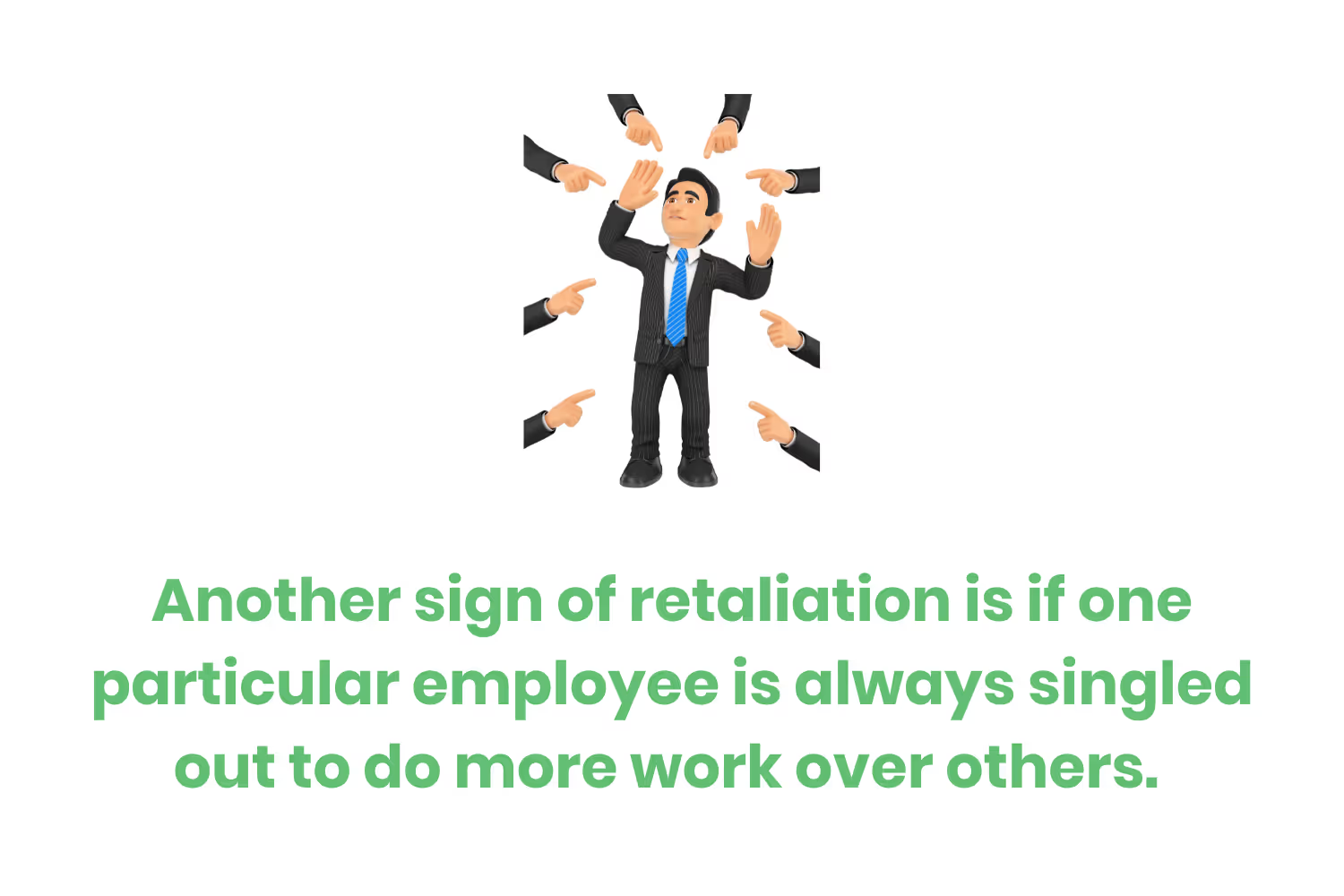
That’s not what I mean by the first sentence.
A sign of retaliation in this sense is if one particular employee is always singled out to do more work over others. Everyone at the job taking on additional responsibilities doesn't qualify…that’s just how the work world works.
But, if you’re an employee and your boss almost exclusively requires you to complete tasks outside of your responsibilities with an increase in pay…they might be retaliating against you.
Sign 6: Verbal or Physical Abuse
At the risk of sounding obvious, an employee who experiences physical/verbal abuse after making a report against their employer is likely experiencing a form of retaliation.
Many employees who report workplace retaliation say they experience verbal abuse by someone in management. However, we can’t place all of the blame on management in this blog. Retaliation claims involving verbal abuse can also include harassment from coworkers, too.

If a threat of violence or a physical attack falls upon an employee at work, this is a criminal and unlawful act that needs addressing.
Physical abuse can include…
- Threatening to fight someone after work hours.
- A slap or punch.
- Shoving or tripping.
- Assault with a weapon.
This isn’t an exhaustive list of examples of physical assault. If you feel you’re experiencing acts of violence you have the right to not only file a lawsuit but a police report as well.
Sign 7: Sexual Harassment
Although sexual harassment could technically fall under the umbrella of the previous section, I felt it needed it's own section.
You see, thousands of employers are now required by law to assign sexual harassment training to their employees on an annual basis.
Sexual harassment falls under a type of abuse. Thus, it is a criminal and unlawful act.
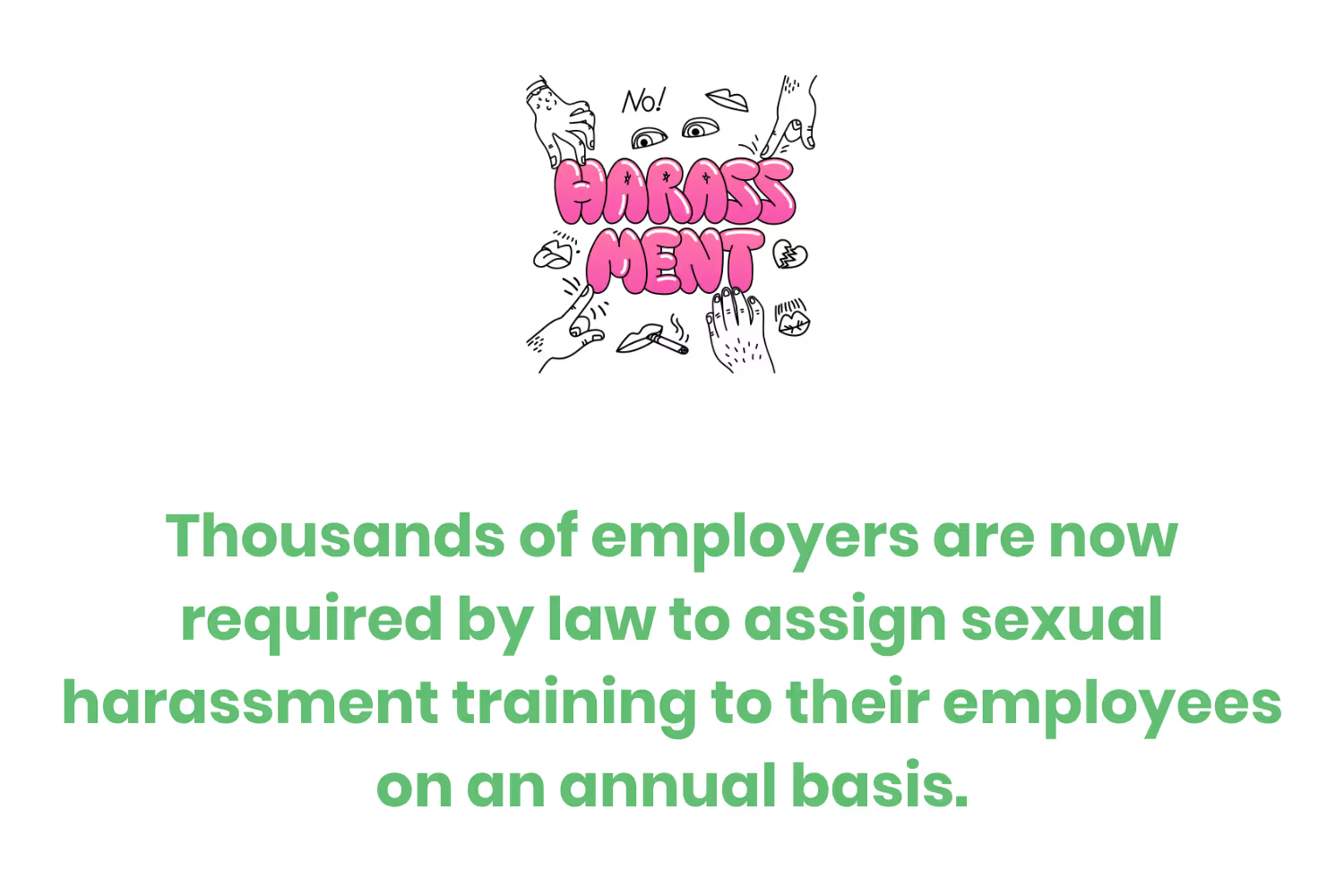
But, how does sexual harassment and retaliation relate in the workplace?
Let’s say that your manager creates a hostile work environment by making sexual remarks towards you. You then report what's happening to the owner of the company you work for. It seems as though your report to the manager went well. However, a few months go by and you receive a demotion and pay cut with no explanation.
Legal Rights Related to Workplace Retaliation
If you find yourself facing consequences after reporting wrong doing in your workplace, you might be the victim of illegal retaliation. It’s important to understand that there are federal laws intended to protect you from this kind of backlash. Let’s go over some steps to take when retaliation occurs.
Steps to Take When Experiencing Retaliation
Negative actions taken against individuals not because of poor job performance, but because the employee exercised their legal rights, is unlawful. To protect your rights, take a look at these steps you can take:
- Make sure to document everything. You want to be able to prove retaliation against you if need be.
- File an internal report if you suspect retaliation. You can either go to HR or upper management for this.
- You also have the option to consult with a workplace retaliation lawyer. Yes, unfortunately this happens enough that there are lawyers who specialize in the practice.
- You can file a complaint with the EEOC, as the organization prohibits employers from retaliating against employees. This is a key step to take when it comes to protecting employees from retaliation.
We know that retaliation can be subtle and difficult to identify, so if you are experiencing workplace retaliation, don’t delay these steps. Remember, there are laws and regulations in place to help you overcome workplace harassment.
What Are the Consequences of Workplace Retaliation?
Consequences when workplace retaliation occurs often extend far beyond the employee directly affected. Adverse actions against one often weigh heavily on the entire team. Employment discrimination along with other workplace violations over time create a discriminatory workplace culture. Trust between employees and their employers falters and professional reputation is on the line.
There are laws intended to protect workers, such as Title VII, the Americans with Disabilities Act ADA, and the Age Discrimination in Employment Act (ADEA). Not abiding by these laws and regulations can mean serious consequences for employers such as:
- Monetary penalties.
- Class action lawsuits.
- Corporate-wide audits.
- Government-monitored compliance programs.
How to Protect Yourself from Workplace Retaliation
If you find after making a report of discrimination or harassment, your work environment becomes more hostile, consider these tips. Document the harassment and discrimination that led up to the initial report. Try to include dates, times, and who was a part of the incident. Make note of any acts of retaliation there after that you have seen. Include as much detail of the retaliation and harassment as you can such as emails, pictures, texts, etc.
It may also be beneficial to request a copy of your performance evaluations and other records before making a retaliation claim. If you've had positive performance evaluations up until you have made a complaint, this can be clear evidence of retaliation. Especially if your employer tries to transfer, demote, fire you, or claims your job performance is poor.
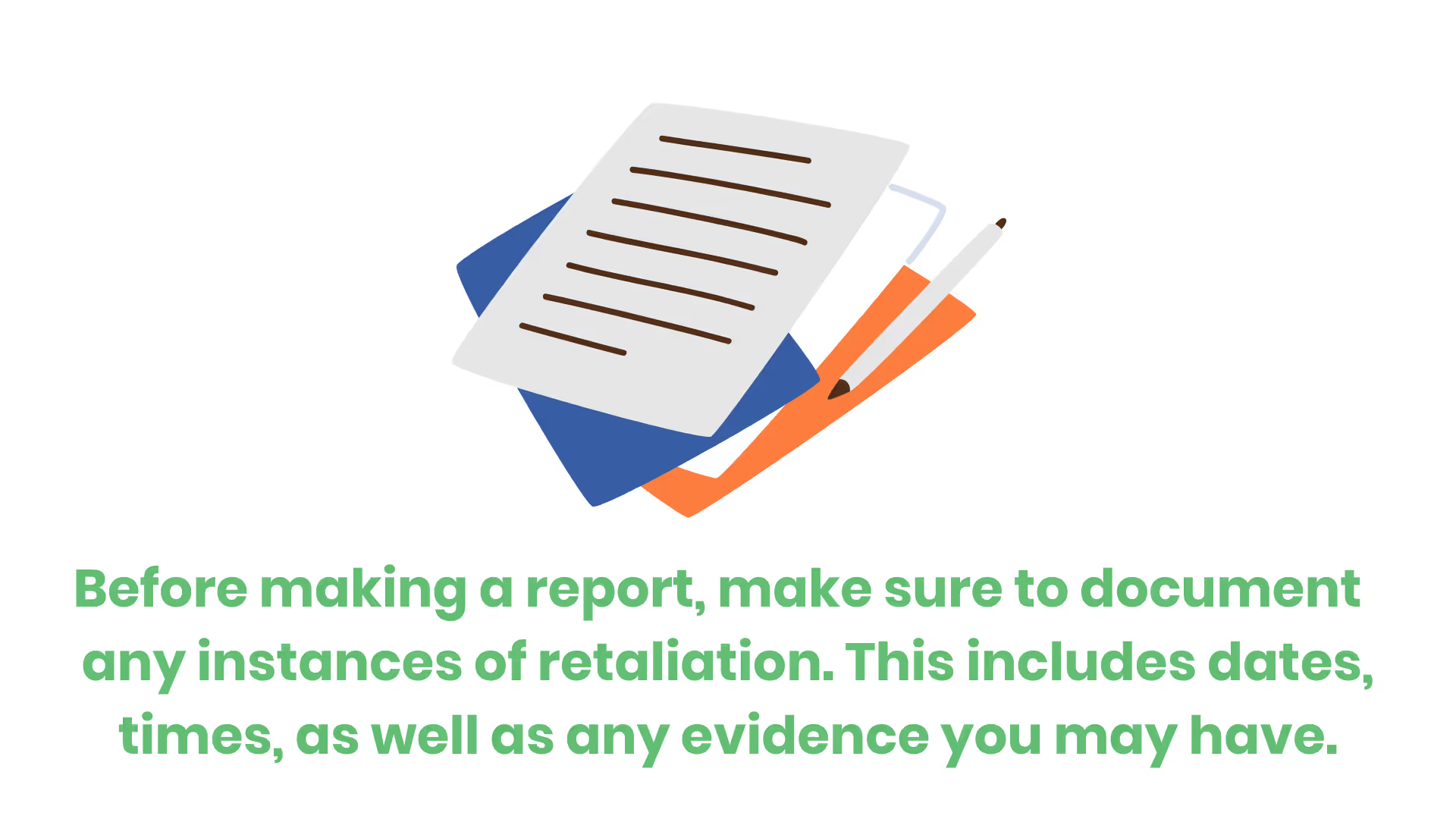
Refer to the federal agency that enforces this Title 7 of the Civil Rights Act of 1964 -- the U.S. Equal Employment Opportunity Commission. You can file a complaint directly with the EEOC by visiting its online portal, via phone, in-person at one of its field offices within your state, or via the mail. You can also choose to consult with a workplace retaliation lawyer who understands how retaliation takes place. For more answers to questions about employment laws, you can call the Wage and Hour Division of the Department of Labor at 1-866 4 US WAGE (1-866-487-9243).
Harassment, discrimination, and retaliation can inflict a negative impact on employee morale. If negative action is falls against you after having made a discrimination or harassment report, you likely are facing retaliation. No matter the type of retaliation you face, you are under the protection of the EEOC and have a right to report it.
Emphasize your product's unique features or benefits to differentiate it from competitors
In nec dictum adipiscing pharetra enim etiam scelerisque dolor purus ipsum egestas cursus vulputate arcu egestas ut eu sed mollis consectetur mattis pharetra curabitur et maecenas in mattis fames consectetur ipsum quis risus mauris aliquam ornare nisl purus at ipsum nulla accumsan consectetur vestibulum suspendisse aliquam condimentum scelerisque lacinia pellentesque vestibulum condimentum turpis ligula pharetra dictum sapien facilisis sapien at sagittis et cursus congue.
- Pharetra curabitur et maecenas in mattis fames consectetur ipsum quis risus.
- Justo urna nisi auctor consequat consectetur dolor lectus blandit.
- Eget egestas volutpat lacinia vestibulum vitae mattis hendrerit.
- Ornare elit odio tellus orci bibendum dictum id sem congue enim amet diam.
Incorporate statistics or specific numbers to highlight the effectiveness or popularity of your offering
Convallis pellentesque ullamcorper sapien sed tristique fermentum proin amet quam tincidunt feugiat vitae neque quisque odio ut pellentesque ac mauris eget lectus. Pretium arcu turpis lacus sapien sit at eu sapien duis magna nunc nibh nam non ut nibh ultrices ultrices elementum egestas enim nisl sed cursus pellentesque sit dignissim enim euismod sit et convallis sed pelis viverra quam at nisl sit pharetra enim nisl nec vestibulum posuere in volutpat sed blandit neque risus.

Use time-sensitive language to encourage immediate action, such as "Limited Time Offer
Feugiat vitae neque quisque odio ut pellentesque ac mauris eget lectus. Pretium arcu turpis lacus sapien sit at eu sapien duis magna nunc nibh nam non ut nibh ultrices ultrices elementum egestas enim nisl sed cursus pellentesque sit dignissim enim euismod sit et convallis sed pelis viverra quam at nisl sit pharetra enim nisl nec vestibulum posuere in volutpat sed blandit neque risus.
- Pharetra curabitur et maecenas in mattis fames consectetur ipsum quis risus.
- Justo urna nisi auctor consequat consectetur dolor lectus blandit.
- Eget egestas volutpat lacinia vestibulum vitae mattis hendrerit.
- Ornare elit odio tellus orci bibendum dictum id sem congue enim amet diam.
Address customer pain points directly by showing how your product solves their problems
Feugiat vitae neque quisque odio ut pellentesque ac mauris eget lectus. Pretium arcu turpis lacus sapien sit at eu sapien duis magna nunc nibh nam non ut nibh ultrices ultrices elementum egestas enim nisl sed cursus pellentesque sit dignissim enim euismod sit et convallis sed pelis viverra quam at nisl sit pharetra enim nisl nec vestibulum posuere in volutpat sed blandit neque risus.
Vel etiam vel amet aenean eget in habitasse nunc duis tellus sem turpis risus aliquam ac volutpat tellus eu faucibus ullamcorper.
Tailor titles to your ideal customer segment using phrases like "Designed for Busy Professionals
Sed pretium id nibh id sit felis vitae volutpat volutpat adipiscing at sodales neque lectus mi phasellus commodo at elit suspendisse ornare faucibus lectus purus viverra in nec aliquet commodo et sed sed nisi tempor mi pellentesque arcu viverra pretium duis enim vulputate dignissim etiam ultrices vitae neque urna proin nibh diam turpis augue lacus.




